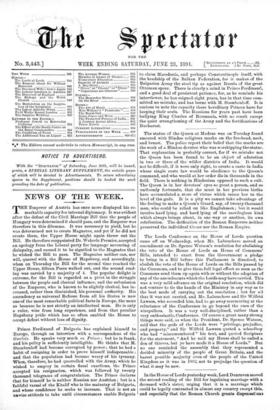Prince Ferdinand of Bulgaria has explained himself to Europe, through
an interview with a correspondent of the Gaulois. He speaks very much en Prince ; but he is frank, and his policy is sufficiently intelligible. He thinks that M. Stambonloff had become corrupted by power; that he had a habit of resigning in order to prove himself indispensable ; and that the population had become weary of his tyranny. When, therefore, he had quarrelled with the Army, which he wished to employ in certain fiscal exactions, the Prince accepted his resignation, which was followed by twenty thousand telegrams of congratulation. The Prince declares that for himself he is neither Russian nor Austrian ; but is a faithful vassal of the Khalif who is the mainstay of Bulgaria, and whose confidence he seeks to increase. That is not an =wise attitude to take until circumstances enable Bulgaria
to claim Macedonia, and perhaps Constantinople itself, with the headship of the Balkan Federation, for it makes of the Bulgarian Army the steel tip as against Russia of the great Ottoman spear. There is clearly a mind in Prince Ferdinand, and a good deal of persistent patience, for, as he reminds his interviewer, he has reigned eight years, has in that time com- mitted no mistake, and has borne with M. Stambouloff. It is curious to note the capacity these hereditary Princes have for keeping their seats. The Russians for years past have been bullying King Charles of Roumania, with no result except the quiet strengthening of the Army and the fortifications of Bucharest.


































